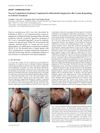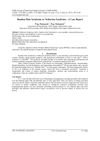 March 2024 in “IP Indian journal of clinical and experimental dermatology”
March 2024 in “IP Indian journal of clinical and experimental dermatology” Elderly in South India commonly suffer from skin issues like wrinkles, dryness, and infections, needing better skin care education.
 January 2024 in “JAAD case reports”
January 2024 in “JAAD case reports” Netherton syndrome can cause severe and chronic vulvovaginal symptoms that may improve with continuous oral contraceptives.
 October 2023 in “Indian Dermatology Online Journal”
October 2023 in “Indian Dermatology Online Journal” Schimmelpenning Syndrome requires careful evaluation and tailored treatment for skin, eye, and developmental issues.
January 2022 in “Indian dermatology online journal” A baby with a skin condition improved with treatment but developed a rare form of the condition affecting only his trunk.
October 2015 in “Cosmetic Dermatology” Hair styling products and tools help improve hair's look and manageability but can damage hair if used incorrectly.
January 2013 in “프로그램북(구 초록집)” Hair perms or treatments seem safe to use up to 3 to 4 times during pregnancy.
5 citations,
April 2016 in “PubMed” Cetuximab often causes skin problems, but they can be managed without stopping treatment.
 14 citations,
January 2015 in “Acta dermato-venereologica”
14 citations,
January 2015 in “Acta dermato-venereologica” Acitretin significantly reduced inflammatory attacks in a woman with Naevus Comedonicus Syndrome but caused side effects.
 January 2023 in “Indian dermatology online journal”
January 2023 in “Indian dermatology online journal” A child with trichothiodystrophy also had autoimmune thyroiditis and anemia, which is a new finding.
 January 2019 in “International journal of dermatology, venereology and leprosy sciences”
January 2019 in “International journal of dermatology, venereology and leprosy sciences” Patients with chronic kidney disease often have various skin problems that affect their quality of life, but early treatment can help.
 October 2016 in “Elsevier eBooks”
October 2016 in “Elsevier eBooks” Common noncancerous skin diseases have various treatments, including topical applications, light therapy, surgery, and medications, with psychological support being important.
 February 2016 in “Acta Medica Marisiensis”
February 2016 in “Acta Medica Marisiensis” A woman with chronic hepatitis C had a rare skin condition linked to her illness.
 3 citations,
May 2011 in “Practice nursing”
3 citations,
May 2011 in “Practice nursing” As skin ages, it gets thinner, paler, and more wrinkled, and protection and care like sunblock and moisturizers are important.
9 citations,
December 2015 in “Journal of Dermatological Case Reports” Narrowband UVB therapy significantly improved a child's rare skin condition.
 3 citations,
January 2020 in “Acta Dermato Venereologica”
3 citations,
January 2020 in “Acta Dermato Venereologica” Netherton Syndrome can cause severe skin lesions in rare cases.
 December 2004 in “Medicine”
December 2004 in “Medicine” Pregnancy can cause skin changes and may affect pre-existing skin conditions, with some treatments not safe for use during pregnancy.
 25 citations,
November 2013 in “Journal of the American Academy of Dermatology”
25 citations,
November 2013 in “Journal of the American Academy of Dermatology” Many patients on new leukemia drugs had mild to moderate skin reactions.
 20 citations,
March 2019 in “Nutrients”
20 citations,
March 2019 in “Nutrients” Rumex japonicus Houtt. may be an effective treatment for atopic dermatitis by reducing inflammation.
 15 citations,
June 2011 in “Journal of Ginseng Research”
15 citations,
June 2011 in “Journal of Ginseng Research” Korean Red Ginseng may improve skin condition and reduce allergy markers in atopic dermatitis patients.
 13 citations,
April 2017 in “Journal of Alternative and Complementary Medicine”
13 citations,
April 2017 in “Journal of Alternative and Complementary Medicine” Traditional and complementary medicine may help with skin conditions, but more high-quality research is needed.
 13 citations,
July 2001 in “International Journal of Dermatology”
13 citations,
July 2001 in “International Journal of Dermatology” Inflammation and Demodex mites might contribute to hair loss, and targeting them could help treat it.
 6 citations,
February 2019 in “JAAD case reports”
6 citations,
February 2019 in “JAAD case reports” Acitretin helped improve hand mobility and skin condition in a patient.
 1 citations,
May 2019 in “Frontiers in Pharmacology”
1 citations,
May 2019 in “Frontiers in Pharmacology” The book provides detailed information on natural ingredients in beauty products and emphasizes the need for more human trials to confirm their effectiveness.
 1 citations,
September 2015 in “Clinics in Dermatology”
1 citations,
September 2015 in “Clinics in Dermatology” Children's skin diseases and treatments differ from adults and require specific approaches.
 August 2019 in “Reactions Weekly”
August 2019 in “Reactions Weekly” Daclizumab may cause psoriasis-like skin problems in multiple sclerosis patients.

 April 2017 in “IOSR journal of dental and medical sciences”
April 2017 in “IOSR journal of dental and medical sciences” Netherton Syndrome is a non-treatable genetic disorder in children causing skin, hair, and allergy issues.

A boy on a ketogenic diet and anti-epileptic drugs developed skin issues due to stopping vitamin supplements, which improved with proper supplementation.
 May 2007 in “Dermatologic Therapy”
May 2007 in “Dermatologic Therapy” Hair care practices like using relaxers and tight braiding can lead to permanent hair loss in black women.
 September 1997 in “Journal of The European Academy of Dermatology and Venereology”
September 1997 in “Journal of The European Academy of Dermatology and Venereology” New treatment improves male hair loss.

























